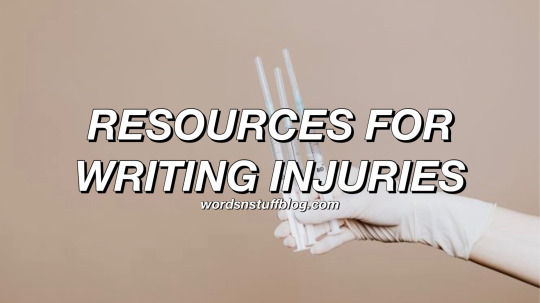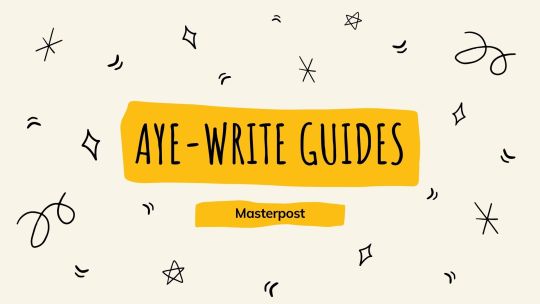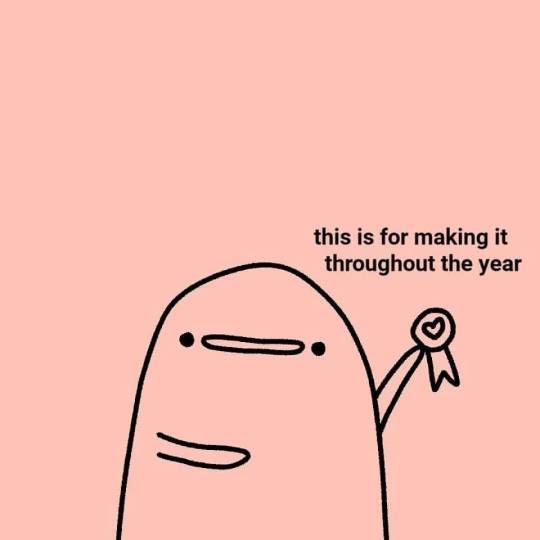Don't wanna be here? Send us removal request.
Text
Resources for Writing Injuries

Patreon || Ko-Fi || Masterlist || Work In Progress
–
Head Injuries
General Information | More
Hematoma
Hemorrhage
Concussion
Edema
Skull Fracture
Diffuse Axonal Injury
Neck
General Information
Neck sprain
Herniated Disk
Pinched Nerve
Cervical Fracture
Broken Neck
Chest (Thoracic)
General Information
Aortic disruption
Blunt cardiac injury
Cardiac tamponade
Flail chest
Hemothorax
Pneumothorax (traumatic pneumothorax, open pneumothorax, and tension pneumothorax)
Pulmonary contusion
Broken Ribs
Broken Collarbone
Continuar lendo
64K notes
·
View notes
Text
The Nine Basic Plots
This is the theory that every story - whether it’s about Victorian England, aliens or unicorn-loving truckers - follows one of nine basic plots.
It’s been about for a while and can be pretty controversial, but whatever your take on it, it’s a fun exercise to figure out where your WIP fits in.
1) Overcoming the monster
This is one of the most common. There’s a monster (whether it be a Dragon, Jeff Bezos, or one of the muppets) that the Hero must defeat to protect their community.
2) Rags to Riches
A Cinderella type story in which the main character is missing something (love, money, etc.) and finds a way to gain it.
3) The Quest
The hero embarks on a perilous journey to obtain a great prize (e.g. The Lord of the Rings, Wizard of Oz and even Finding Nemo).
4) Voyage and return
A story which sends the protagonist to a strange land, from which they return changed (usually for the better) (e.g. Alice in Wonderland).
5) Comedy
My personal favourite. A story made up of comedic events, involving confusion, misunderstanding and mistaken identity (e.g. Midsummer Night’s Dream, The Office).
6) Tragedy
This is essentially comedy’s mirror image. Your protagonist falls from prosperity to destruction, because of a cruel twist of fate or their own mistakes (Shakespeare had a talent for writing these).
7) Rebirth
This plot type has roots in religion, but most modern stories simply show a character changing their ways and becoming a better person. A Christmas Carol is a classic example of this one.
These next two weren’t previously included in the list, as they were very rare story types. However, in modern times, they are clearly far more popular.
8) Mystery
Now one of the most common plots, a mystery involves a group of people coming together to figure out the truth of some horrendous event (e.g. Gravity Falls, Murder She Wrote, pretty much anything by Agatha Christie).
9) Rebellion against the one
Here, a hero rebels against a powerful organisation or entity that controls their entire world. This has become very popular in dystopian fiction (e.g. 1984).
So those are the 9(ish) basic plots! Which ones does your WIP fit into (if any)? And does it fit into more than one?
1K notes
·
View notes
Text
masterlist of characters’ deepest fears
ok maybe i shouldn’t call this a masterlist but it’s pretty comprehensive i think hello!! i was having a lot of trouble finding resources for ideas of fears to give to characters so i thought i would compile my own list, then i figured i might as well share it with y’all!
this list is for those deeper, more intangible, existential type of fears rather than fears such as illness or bugs or clowns (all very valid fears!! just not the kind i needed rn) it might be a little repetitive but i wanted to be thorough/account for nuances and such. hope this is helpful :-)
• Fear of intimacy • Fear of death/dying • Fear of failure • Fear of rejection • Fear of commitment • Fear of being alone/loneliness • Fear of God • Fear of abandonment • Fear of change • Fear of the unknown • Fear of success • Fear of love • Fear of being forgotten/ignored • Fear of getting old/growing up • Fear of the future • Fear of loss • Fear of forgetting/losing memories/amnesia • Fear of becoming their parents • Fear of being a bad person • Fear of being unwanted
Keep reading
3K notes
·
View notes
Note
Hi! Do you have any tips on how to make a story (either a new idea or an existing work in progress) more original? I feel like all ideas that I have follow somewhat the same "formula" or structure and I would like to try to work with something different. I don't know if you get what I mean, but for example, how would I make a murder mystery more original when all I can think about is the usual "people died and someone has to find out who did it"
Making Original Stories More Original
Here's the thing... a murder mystery is about figuring out who committed a murder, so "people died and someone has to find out" is literally what the story is about. If you don't want to write a story where someone died and someone else has to figure it out, don't write a murder mystery.
Most stories can be placed into a category, genre, or subgenre. Those categories, genres, and subgenres all have very specific formulas/structures, tropes, and conventions that they follow. That's a good thing, because when readers pick up a particular book, say a romantic urban fantasy, there are very specific things they're looking for in that story. Romance, obviously, an urban setting, and an element of supernatural/magic/both. If someone picks up a story that's marketed as a romantic urban fantasy, and sounds like a romantic urban fantasy, but then it ends up being an espionage thriller set in a series of rural 19th century villages, the reader is going to be very confused.
Instead of trying to vary the genre-expected formulas, tropes, and conventions, look at other things you can do to make your story stand out. Is there a way to follow the tried and true formula, but in an unexpected way? Is there a way you can put a fresh new spin on the usual tropes? Is there a way you can augment or even subvert the typical conventions?
It sometimes helps to look at things like characters, POV, setting, and subplot. For example, the "detective" in murder mysteries tends to actually be a detective, private investigator, journalist, crime writer, or someone close to the victim. Less often, it's a nosy neighbor, a curious blogger, a trio of sleuth-happy 7-year-olds, or some rando who stumbles into the case and falls down the mystery-solving rabbit hole. The POV in murder mysteries tends to be that of the main person trying to solve the crime, but there are other POVs to consider: the POV of the perpetrator, the POV of an accomplice, the POV of someone close to the perpetrator but not entirely in the know, the POV someone close to the detective but on the periphery, or even the POV of the victim (think Christopher Pike's Remember Me or Alice Sebold's The Lovely Bones.) Murder mysteries tend to be set in modern small towns or big cities. Thanks to the popularity of Sherlock Holmes, they're also commonly set in places like Victorian London. What about a murder mystery set in colonial Philadelphia? Or Ancient Rome? Or on a battleship in WWII? The main subplot in a murder mystery tends to be the resolution of a tragedy or mystery in the investigator's life, or sometimes a romance. What if the subplot was an alien invasion that's taking place in the background, but then it turns out the murder is related to the alien invasion? What if the subplot was the political campaign of the investigator's spouse, and then it turned out the murder was related to the political campaign? These are just some examples of how you can change up a murder mystery while still keeping it a murder mystery, and you can do the same thing with stories in any category or genre.
Have fun with it!
•••••••••••••••••••••••••••••••••
Have a writing question? My inbox is always open!
Visit my FAQ
Find answers fast on my Master List of Top Posts
Go to ko-fi.com/wqa to buy me coffee or see my commissions
56 notes
·
View notes
Text

Hi folks! Here is the masterpost of writing tips and guides I’ve written! These guides encompass what I have learned, found useful, or what works for me, so I hope they are in some way useful for you!
Finished guides:
Showing vs. Telling
A (Quick) Guide to Foreshadowing
Writing About Food
A Guide to Opening Lines
Top Tips for Clues, Red Herrings and Breadcrumbing
Beta Reading and Feedback
A Guide to Inciting Incidents
A Mini Guide to Writing Mysteries
A Guide to Writing Unreliable Narrators
A Quick Guide to Varying Sentence Starters
Upcoming Guides:
Imagery (Using simile/metaphor/personification and other literary techniques)
My asks are open for any suggestions for guides or questions/topics to included/covered!
Disclaimer: As with every writing guide and every piece of writing advice, these guides are in no way to be taken as completely 100% correct for everyone! The wonderful thing about writing is how personal it is and there is no one-size-fits-all in writing advice! Nor should there be.
993 notes
·
View notes
Text
daily reminder that if you create it, it’s art. it doesn’t have to be perfect. it just has to have bits of you in it <3
15K notes
·
View notes
Note
Okay so I'm in theatre (for a little background). I've been following this blog for a while and I'm still a little confused on how to write scripts (it's a goal I have for the future). Could you go over the basics of writing scripts?
Screenwriting 101
Most important thing is to read and study screenplays. Watching movies and TV-shows is also advised to get a feel for how scenes are built and characters presented.
For when you’re writing your script:
Visualize your scenes
Read your dialogue out loud, what reads good on paper might not translate the same when spoken
I generally don’t recommend spending hours reading through screenwriting articles, rules or techniques. It’s good to get a feel for what’s out there, but too much information can get overwhelming. It's better to learn as you go.
Your script doesn't have to be created in chronological order, think of it more as a puzzle where you piece your scenes together
Screenwriting can be overwhelming when you first start out, which is why it’s recommended that you finish your draft before you start looking further into the rules
More things to keep in mind:
Enter late, exit early
This is a key aspect to screenwriting, and perhaps the most important mindset to adapt. It’s a technique that forces you to focus on what’s crucial to include in a scene.
Here's a few questions you can ask yourself to determine whether or not a certain action is crucial to the scene:
• Does it impact the plot? (Establish the world around you, introduce or prepare the relationship between two individuals?) • Does it add invaluable insight into a character’s motivations, goals or personality? • Does it make the scene more memorable? • Is it a payoff to an earlier scene or set-up for a future one? • Does the scene simply not work without it?
Even more things:
If your character is about to enter the kitchen, and your slug line reads, INT. KITCHEN - NIGHT, there is no reason to write '''character enters the kitchen.'' The slug line already tells us our location, and ''character enters.'' will suffice.
An example; say you have a character entering the therapist's office. Most of the time there's no need for introductions or small-talk. Instead start the scene by having the character sit on the sofa, already having a deep conversation with their therapist. Cut out the chit-chat. You need to save your pages!
Screenwriting VS Writing a Novel
Remember, you’re much more limited writing a screenplay than you are writing a novel. Scripts need to be fast-paced:
You develop your characters through action and dialogue, as opposed to description and internal monologues. All and any emotion have to come across in your characters actions, something that has to be shown on screen, which leads us to another important point:
If something isn’t shown on screen, it doesn’t belong in the script! You only write down what is seen, or heard. Nothing else. That includes camera direction.
Action lines:
Action lines are exactly what they sound like: it's where you describe what happens in the scene. Again — only what appears on screen, meaning — don’t write what your characters are thinking, or feeling. We can’t see their inner thoughts or feelings, leave it to your actors to interpret the scene. You don't need to direct them.
More on action lines:
Every paragraph of action lines should be between 1 to 4 lines long
Screenplays are written in present tense. It’s “she arrives at the house” as opposed to “she came to the house.”
Synonyms are important to use for an interesting read, and as a generally rule you should avoid generic words (like walk, for example) but less is still more. Make sure not to go completely overboard with synonyms in each sentence you write)
Parentheticals are used to communicate emotion, action or delivery within a script's dialogue.
Parentheticals can also be used to indicate a pause (beat) or (then) in a character's dialogue, but use them sparingly.
You only imply tone when it can be misinterpreted (for example: the atmosphere of the scene is flirty, but the actor should be snarky delivering the line).
What should be capitalized in a script:
Things that should ALWAYS be capitalized:
Character names above dialogue
Scene headings and slug lines
Transitions
Character extensions, such as V.O (voice-over) and O.S (off-screen)
Headlines and inserts
Always (and only) capitalize a character’s name when they are first introduced on screen/in the script (in your action lines)
Sounds are capitalized, as is anything important that you want to draw attention to, such as certain objects and visual effects.
Use sparingly, though! If something reads better without caps, don’t cap it. Your script should be easy to read more than anything.
More things to keep in mind:
It's said that 1 page equals about 1 minute of screentime, and while it's a good rule in theory, it is not very accurate and the runtime of your movie cannot be determined by the amount of pages in your script.
There is a debate going on regarding whether to bold your sluglines or not. This is completely irrelevant and not something that in any way going is to affect your story.
Visualize your scenes, read your dialogue out loud, enter late and exit early. Keep those things in mind at all times.
399 notes
·
View notes
Text
“Read a lot. Read broadly… Tell stories to your friends, and pay attention to when they get bored… Write a lot.”
— John Green
290 notes
·
View notes
Text
Fleshing out that vague idea
YOU HAVE A PLOT. Well, okay, you have a character. Or maybe just this one cool image. Problem is, that’s all it is, and it’s hard to write an entire novel on a month with just a vague idea.
Now, you might say, “but I’ve worked on my character for so long they’re a wizard/vampire/space pirate rolled into one, how can I possibly fit that into a plot,” and I say to that, weirder books have been published, you’ll be fine. Our main goal is to figure out how to get that sweet space vampire fighting bisexual cyborg into a book you can write in thirty days. Though that seems challenging, never fear, for we are going to give you a working framework with which to move forward with. It goes like this:
A [character type] has [a problem], and [tries to fix it]. However, [plot twist/inciting event] happens, and [deadly complication ensues].
Yes, we are talking about loglines. Don’t groan, I know these are hard. Our goal is simply to end up with a starting point. It doesn’t have to be pretty, or succinct. We are merely trying to find a starting point, so let’s tackle each one by one:
A Character: Your characters are complex individuals, but we’re going to distill them to their most distinctive, plot important aspects. A sixteen-year-old wizard. A trans lady dragonrider. A lonely accountant, etc. Since we’re not trying to sell anything, we can expand a bit and give into cliches. “A eighteen-year-old werewolf with a chip on his shoulder.” “A trans dude with a terrible crush on his married landlady.” “A lonely accountant into the sanguinarian scene.” Etc. Have fun with it.
A Problem: We’ve got two main types, external and internal. External will be the outward issue being dealt with - solving a murder, finding a girlfriend, stopping an asteroid from destroying the moon, etc.An internal problem will be the driving force of the character - needing to fix a broken relationship, facing a fatal flaw, confronting an addiction, etc. Both will be important to driving your plot, so consider how connected they’ll be both in tackling the plot and complicating it.
An Inciting Event: No way back, this it what thrusts your character forward. The discovery that their mother was a werewolf. The loss of an important necklace. Realizing you’re a magical girl in a world where magical girls are evil, etc. You are going to ruin your character’s life, so I advise doing it as gleefully as possible.
A Complication: We’ve got the basics of our plot, now we have to figure out how to keep it moving. Your protagonist’s mother was murdered for being a werewolf, and now they’re after your character too too. The necklace was more than important, the mob desperately wants it back and knows your character was the last person who had it. Your sixteen-year-old wizard has cast a spell to raise the dead, and now the Wizard Council is out to kill her to stop it.
You now have the beginnings of a plot and where it’ll take you. There’s going to be more complications to carry you through to the finish line, and good god don’t stop writing them down if you’re on a roll, but this should at least get you out the gate. Good luck!
2K notes
·
View notes
Text
A list of nice words we should use more to describe people :
Adventurous : willing to undertake new and daring enterprises.
Affectionate : having or displaying warmth or fondness.
Ambitious : having a strong desire for success or achievement.
Amiable : diffusing warmth and friendliness.
Brave : not being afraid of danger.
Considerate : showing concern for the rights and feelings of others.
Courageous : able to face and deal with danger or fear without flinching.
Courteous : characterized by politeness and gracious good manners.
Diligent : characterized by care and perseverance in carrying out tasks.
Empathetic : showing ready comprehension of others' states.
Exuberant : unrestrained, especially with regard to feelings.
Gregarious : temperamentally seeking and enjoying the company of others.
Humble : marked by meekness or modesty; not arrogant or prideful.
Impartial : free from undue bias or preconceived opinions.
Intuitive : obtained through instinctive knowledge.
Inventive : marked by independence and creativity in thought or action.
Kind : behaving in a caring way towards people
Passionate : having or expressing strong emotions.
Philosophical : meeting trouble with level-headed detachment.
Practical : guided by experience and observation rather than theory.
Rational : having its source in or being guided by the intellect.
Reliable : worthy of trust.
Resourceful : adroit or imaginative.
Sensible : able to feel or perceive.
Sincere : open and genuine; not deceitful.
Sympathetic : expressing compassion or friendly fellow feelings.
Witty : demonstrating striking cleverness and humor.
15K notes
·
View notes


























